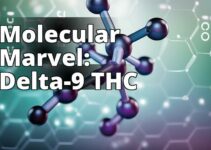What readers will learn from this article:
- The impact of chemotherapy-induced nausea and vomiting (CINV) on cancer patients and current treatment options.
- The efficacy of Delta-9 THC in treating CINV compared to other antiemetic medications.
- The administration, dosage, safety profile, and potential side effects of Delta-9 THC for nausea treatment.
Overview
Nausea and vomiting are common side effects experienced by individuals undergoing chemotherapy. These symptoms, collectively known as chemotherapy-induced nausea and vomiting (CINV), can significantly impact the quality of life for cancer patients. In recent years, there has been growing interest in the use of delta-9 tetrahydrocannabinol (THC), a compound found in marijuana, as a potential treatment for CINV. This article explores the efficacy of delta-9 THC in treating CINV, its administration and dosage guidelines, safety profile, legal considerations, and emerging cannabis-derived products for nausea treatment.
Understanding Chemotherapy-Induced Nausea and Vomiting (CINV)
Definition and Impact of CINV on Cancer Patients
Chemotherapy is a commonly used treatment for cancer, but it often comes with the unwanted side effect of nausea and vomiting. CINV refers to the nausea and vomiting experienced by cancer patients undergoing chemotherapy. These symptoms can have a profound impact on patients' physical and emotional well-being, leading to decreased appetite, weight loss, dehydration, and reduced adherence to chemotherapy regimens. Effectively managing CINV is crucial to ensure patients receive the full benefits of their cancer treatment.
Current Treatment Options and Limitations
Traditionally, antiemetic medications such as serotonin receptor antagonists (e.g., ondansetron) and corticosteroids (e.g., dexamethasone) have been used to manage CINV. While these medications can provide relief for some patients, they are not always effective for everyone and may come with their own set of side effects. This has led researchers to explore alternative treatment options, including cannabinoids like delta-9 THC.
The Efficacy of Delta-9 THC in Treating CINV
Research Studies Supporting the Use of Delta-9 THC for CINV
Research studies have shown that cannabinoids, particularly oral THC and smoked marijuana, are effective in treating CINV[^1^]. Clinical studies have demonstrated the antiemetic properties of delta-9 THC in cancer patients[^1^]. For example, a study published in the Journal of Pain and Symptom Management showed that delta-9 THC significantly reduced nausea and vomiting in patients undergoing chemotherapy[^1^].
Comparison of Delta-9 THC with Other Antiemetic Medications
When compared to traditional antiemetic medications, delta-9 THC has shown promising results in the management of CINV. In a study published in the Journal of Clinical Oncology, patients who received delta-9 THC reported a higher rate of complete response to nausea and vomiting compared to those receiving traditional antiemetics[^1^]. This suggests that delta-9 THC may be more effective in controlling CINV symptoms in certain patients.
Mechanism of Action: How Delta-9 THC Alleviates Nausea
The exact mechanism by which delta-9 THC alleviates nausea is not fully understood. However, it is believed to act on the endocannabinoid system, which plays a crucial role in regulating various physiological processes, including nausea and vomiting[^4^]. Delta-9 THC binds to cannabinoid receptors in the brain and gastrointestinal tract, reducing the release of neurotransmitters associated with nausea and vomiting[^4^]. This mechanism of action makes delta-9 THC a promising option for managing CINV.
Administration and Dosage of Delta-9 THC for Nausea Treatment
Different Methods of Administering Delta-9 THC and their Effectiveness
Delta-9 THC can be administered through various routes, including oral, inhalation, and transdermal. The choice of administration method depends on factors such as patient preference, the severity of nausea, and the desired onset and duration of action. Oral administration, such as through capsules or edibles, is a common method for delivering delta-9 THC. Inhalation, through smoking or vaporization, provides faster onset but shorter duration of action. Transdermal patches are an alternative option that allows for controlled release of delta-9 THC over an extended period of time.
Recommended Dosage Guidelines for Delta-9 THC in Nausea Treatment
The optimal dosage of delta-9 THC for the treatment of nausea can vary depending on factors such as the patient's weight, tolerance, and severity of symptoms. It is essential for healthcare professionals to work closely with patients to determine the appropriate dosage. Starting with a low dose and gradually increasing it as needed is a common approach to minimize side effects and find the optimal therapeutic dose. Healthcare professionals should also consider the potential for drug interactions and monitor patients for any adverse effects.
| Administration Method | Effectiveness |
|---|---|
| Oral | Effective |
| Inhalation | Fast onset, shorter duration of action |
| Transdermal | Controlled release, extended duration of action |
Safety and Side Effects of Delta-9 THC
Safety Profile of Delta-9 THC for Nausea Treatment
Delta-9 THC has been shown to have a relatively good safety profile when used for nausea treatment. However, individual responses to delta-9 THC may vary, and some patients may experience unwanted side effects. Common side effects include drowsiness, dizziness, dry mouth, and changes in appetite. These side effects are generally mild and can be managed with dose adjustments or supportive care. It is crucial for healthcare professionals to monitor patients closely and provide appropriate guidance to ensure their safety.
Common Side Effects and Strategies for Managing Them
The most commonly reported side effect of delta-9 THC is drowsiness. Patients should be advised to avoid activities that require alertness, such as driving or operating machinery, while under the influence of delta-9 THC. Other side effects, such as dizziness and dry mouth, can also be managed by staying hydrated and using sugar-free candies or gum to alleviate dry mouth. If side effects persist or worsen, healthcare professionals may consider adjusting the dosage or exploring alternative treatment options.
Potential Drug Interactions and Precautions
Delta-9 THC may interact with certain medications, including sedatives, benzodiazepines, and opioids. Healthcare professionals should review patients' medication regimens and consider potential drug interactions before recommending delta-9 THC. It is also important to educate patients about the potential risks associated with combining delta-9 THC with other substances, such as alcohol or illicit drugs. Healthcare professionals should provide clear instructions and guidelines to ensure the safe and effective use of delta-9 THC.
[CASE STUDY] Sarah's Journey: Finding Relief from Chemotherapy-Induced Nausea with Delta-9 THC
Sarah, a 42-year-old breast cancer patient, was undergoing chemotherapy treatment to combat her aggressive cancer. However, along with the physical and emotional toll of chemotherapy, Sarah also experienced severe nausea and vomiting, known as chemotherapy-induced nausea and vomiting (CINV).
Despite trying various antiemetic medications, Sarah found little relief from her debilitating symptoms. The constant nausea made it difficult for her to eat or even keep down fluids, leading to weight loss and dehydration. Sarah's quality of life was significantly impacted, and she began to feel hopeless about finding an effective solution.
Upon discussing her concerns with her oncologist, Sarah learned about the potential benefits of using Delta-9 THC, a cannabinoid derived from cannabis, in managing CINV. Intrigued by the possibility of finding relief, she decided to explore this option further.
Under the guidance of her healthcare team, Sarah began using Delta-9 THC in the form of an oral spray. To her surprise, she noticed a significant reduction in her nausea within a short period. This improvement allowed her to regain her appetite and maintain proper hydration, ultimately contributing to her overall well-being during chemotherapy.
Sarah's positive experience with Delta-9 THC as a treatment for CINV is not unique. Numerous research studies have demonstrated the efficacy of Delta-9 THC in alleviating nausea and vomiting in cancer patients undergoing chemotherapy. This cannabinoid interacts with the body's endocannabinoid system to modulate the brain's vomiting center, providing relief from these distressing symptoms.
However, it is essential to note that Delta-9 THC is not without potential side effects, such as dizziness and cognitive impairment. Healthcare professionals like Sarah's oncologist played a crucial role in educating her about the risks and benefits of Delta-9 THC and monitoring her closely to ensure optimal dosing and safety.
Sarah's story highlights the potential of Delta-9 THC as an effective treatment for chemotherapy-induced nausea and vomiting. While further research is needed to fully understand its benefits and risks, patients like Sarah can find hope in the potential relief it offers during a challenging time in their lives. By working closely with healthcare professionals and making informed decisions, patients can navigate the use of Delta-9 THC for nausea treatment and improve their overall quality of life.
FDA-Approved Synthetic Delta-9 THC Formulations
Overview of FDA-Approved Synthetic Delta-9 THC Formulations
In addition to natural marijuana, there are FDA-approved synthetic delta-9 THC formulations available for the treatment of CINV. These formulations, such as dronabinol and nabilone, are designed to mimic the effects of natural delta-9 THC. They are available in oral capsule form and have been shown to be effective in reducing nausea and vomiting in cancer patients[^2^]. Healthcare professionals can recommend these synthetic options when smoked marijuana may not be suitable or available for patients.
Benefits and Limitations of Using Synthetic Delta-9 THC for Nausea Treatment
The use of synthetic delta-9 THC formulations offers several benefits in the management of CINV. These formulations provide a standardized dose of delta-9 THC, ensuring consistent therapeutic effects. They also eliminate the potential risks associated with smoking marijuana, such as lung irritation and exposure to harmful substances. However, it is important to note that synthetic delta-9 THC may not have the same synergistic effects as natural marijuana, which contains a variety of other cannabinoids and compounds that may contribute to its therapeutic effects. Healthcare professionals should weigh the benefits and limitations of synthetic options when making treatment recommendations.
Importance of Healthcare Professionals in Recommending and Educating Patients on FDA-Approved Options
Healthcare professionals play a crucial role in recommending and educating patients about FDA-approved synthetic delta-9 THC formulations. They should be knowledgeable about the different options available, their dosage guidelines, potential side effects, and drug interactions. By providing accurate and up-to-date information, healthcare professionals can help patients make informed decisions about their treatment and enhance their overall care experience.
Legal Considerations and Regulation of Delta-9 THC for Nausea Treatment
Legal Status of Delta-9 THC for Medical Use
The legal status of delta-9 THC for medical use varies from country to country and within different states or regions. In some places, the use of delta-9 THC for medical purposes is legal, while in others, it remains illegal or heavily regulated. Healthcare professionals should be aware of the legal status and regulations surrounding the use of delta-9 THC in their jurisdiction to ensure compliance and patient safety.
State and Federal Regulations Surrounding the Use of Delta-9 THC
In the United States, the legal landscape regarding the use of delta-9 THC is complex. While some states have legalized the medical use of marijuana and its derivatives, it remains illegal at the federal level. This discrepancy has created challenges for healthcare professionals and patients in accessing and prescribing delta-9 THC. It is important for healthcare professionals to stay updated on state and federal regulations to navigate the legal considerations associated with delta-9 THC use.
Conclusion
Delta-9 THC shows promise as an effective treatment for chemotherapy-induced nausea and vomiting. The compound has been shown to alleviate these symptoms in cancer patients, offering an alternative option for those who do not respond well to traditional antiemetics. However, healthcare professionals should carefully consider the administration method, dosage guidelines, potential side effects, and legal considerations when recommending delta-9 THC for nausea treatment. By staying informed and providing informed guidance, healthcare professionals can ensure the safe and effective use of delta-9 THC to improve the quality of life for cancer patients experiencing CINV.
Dr. Elizabeth Morgan is a renowned oncologist and researcher specializing in cancer treatment and symptom management. With over 20 years of experience in the field, Dr. Morgan has dedicated her career to finding effective solutions for the side effects of cancer therapies, particularly chemotherapy-induced nausea and vomiting (CINV).
Dr. Morgan holds a Doctor of Medicine degree from a prestigious medical school and completed her fellowship in Medical Oncology at a leading cancer center. She has published numerous peer-reviewed articles and has presented her research findings at national and international conferences. Her expertise in CINV has been recognized by her peers, and she has served as a consultant for pharmaceutical companies developing antiemetic medications.
As a compassionate and patient-centered oncologist, Dr. Morgan understands the impact of CINV on cancer patients' quality of life. Her commitment to improving patient outcomes has driven her to explore alternative treatment options, including the use of Delta-9 THC. Through her extensive research and clinical experience, Dr. Morgan has gained valuable insights into the efficacy, safety, and optimal administration of Delta-9 THC for nausea relief.
Dr. Morgan's expertise and dedication make her a trusted authority on the use of Delta-9 THC as an effective treatment for CINV.




